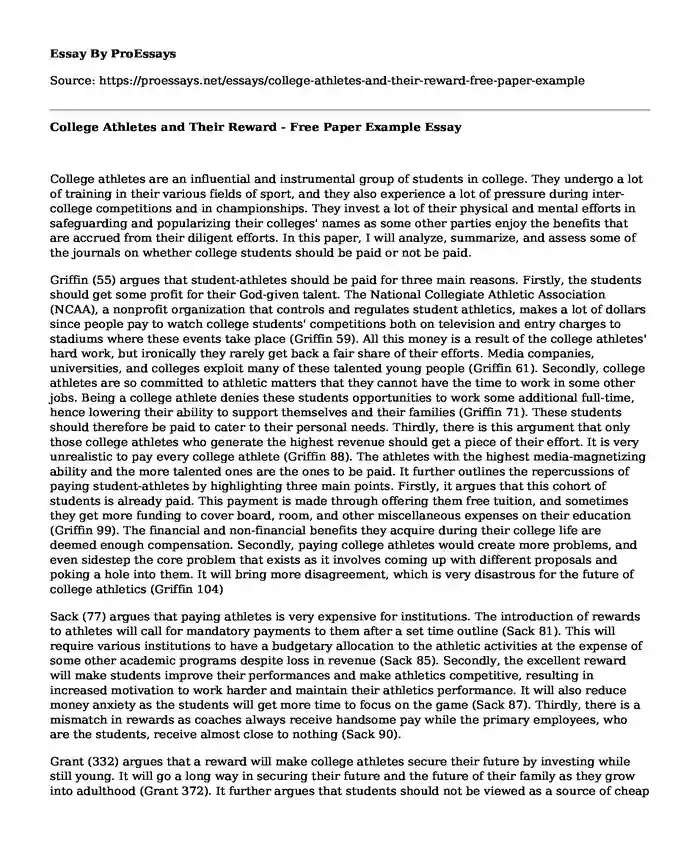College athletes are an influential and instrumental group of students in college. They undergo a lot of training in their various fields of sport, and they also experience a lot of pressure during inter-college competitions and in championships. They invest a lot of their physical and mental efforts in safeguarding and popularizing their colleges' names as some other parties enjoy the benefits that are accrued from their diligent efforts. In this paper, I will analyze, summarize, and assess some of the journals on whether college students should be paid or not be paid.
Griffin (55) argues that student-athletes should be paid for three main reasons. Firstly, the students should get some profit for their God-given talent. The National Collegiate Athletic Association (NCAA), a nonprofit organization that controls and regulates student athletics, makes a lot of dollars since people pay to watch college students' competitions both on television and entry charges to stadiums where these events take place (Griffin 59). All this money is a result of the college athletes' hard work, but ironically they rarely get back a fair share of their efforts. Media companies, universities, and colleges exploit many of these talented young people (Griffin 61). Secondly, college athletes are so committed to athletic matters that they cannot have the time to work in some other jobs. Being a college athlete denies these students opportunities to work some additional full-time, hence lowering their ability to support themselves and their families (Griffin 71). These students should therefore be paid to cater to their personal needs. Thirdly, there is this argument that only those college athletes who generate the highest revenue should get a piece of their effort. It is very unrealistic to pay every college athlete (Griffin 88). The athletes with the highest media-magnetizing ability and the more talented ones are the ones to be paid. It further outlines the repercussions of paying student-athletes by highlighting three main points. Firstly, it argues that this cohort of students is already paid. This payment is made through offering them free tuition, and sometimes they get more funding to cover board, room, and other miscellaneous expenses on their education (Griffin 99). The financial and non-financial benefits they acquire during their college life are deemed enough compensation. Secondly, paying college athletes would create more problems, and even sidestep the core problem that exists as it involves coming up with different proposals and poking a hole into them. It will bring more disagreement, which is very disastrous for the future of college athletics (Griffin 104)
Sack (77) argues that paying athletes is very expensive for institutions. The introduction of rewards to athletes will call for mandatory payments to them after a set time outline (Sack 81). This will require various institutions to have a budgetary allocation to the athletic activities at the expense of some other academic programs despite loss in revenue (Sack 85). Secondly, the excellent reward will make students improve their performances and make athletics competitive, resulting in increased motivation to work harder and maintain their athletics performance. It will also reduce money anxiety as the students will get more time to focus on the game (Sack 87). Thirdly, there is a mismatch in rewards as coaches always receive handsome pay while the primary employees, who are the students, receive almost close to nothing (Sack 90).
Grant (332) argues that a reward will make college athletes secure their future by investing while still young. It will go a long way in securing their future and the future of their family as they grow into adulthood (Grant 372). It further argues that students should not be viewed as a source of cheap labor. It is very unfair for students to fatten the college administration, executives, and coaches' pockets. Simultaneously, they are discriminated against from getting part of the enormous revenue simply because they get a scholarship (Grant 423). College athletes also spend a lot of time on sports at the expense of their academic work. The majority of college students treat athletics as a full-time job as a lot of time is taken during training and in the championship (Grant 450).
Conclusion
In conclusion, college students are some of the country's most hardworking people as they grind through abusive practices and workouts every day of the year, adding up to the demanding college courses. Therefore, they should be paid since some of them generate a lot of revenue for their colleges and their financial security since they treat athletics as a full-time job.
Works Cited
Griffin G. Should College Athletes Be Paid?. 1st ed. Detroit: Greenhaven Press; 2008:30-105. https://www.worldcat.org/title/should-college-athletes-be-paid/oclc/731035010
Sack A, Staurowsky E. College Athlets For Hire. 1st ed. Westport, Conn.: Praeger; 1998:77-90. https://scholarship.law.marquette.edu/cgi/viewcontent.cgi?article=1448&context=sportslaw
Grant R, Leadley J, Zygmont Z. The Economics Of Intercollegiate Sports. 1st ed. Singapore: World Scientific; 2015:332-450 https://econpapers.repec.org/bookchap/wsiwsbook/9082.htm
Cite this page
College Athletes and Their Reward - Free Paper Example. (2024, Jan 09). Retrieved from https://proessays.net/essays/college-athletes-and-their-reward-free-paper-example
If you are the original author of this essay and no longer wish to have it published on the ProEssays website, please click below to request its removal:
- Effects That Leadership Styles of Teachers Have on the Performance of Students in Licensure Examinations
- Supporting Essay for Lesson Plan
- Experience of 10 Days of Meditation Paper Example
- Public Children Services Organizations Analysis Paper Example
- Essay Example on Kids Confidence and Working Better: A Scene Explained
- Descriptive Essay Example About the Gym
- Social Media Use - Essay Example







